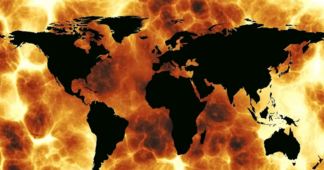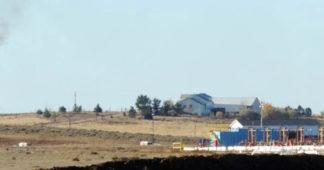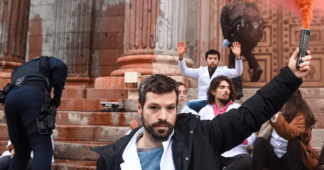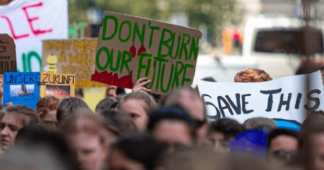“This is about as meaningful as a target to prevent lung cancer without any plan to end smoking.”
By Jessica Corbett
Green campaigners on Tuesday called out the European Commission’s new climate targets for 2040 as “inadequate and a betrayal of climate justice.”
The commission released an impact assessment on pathways to make the European Union climate-neutral by 2050 and made a related recommendation for a 90% reduction in net greenhouse gas emissions by 2040 compared with 1990 levels—kicking off a discussion that is supposed to result in legislation only after upcoming elections.
In response, Climate Action Tracker (CAT) highlighted that the proposal from the E.U. executive not only “assumes no update to the 2030 target” but also “doesn’t include a phaseout of fossil fuels, and relies heavily on fossil carbon capture and storage (CCS) including in the power sector.”
“While a 2040 target is welcome, governments must still remain laser-focussed on improving their climate action within this decade, by strengthening their 2030 targets,” said the CAT’s E.U. lead Sarah Heck of Climate Analytics. “Without governments taking strong pre-2030 climate action, it’s highly unlikely the world will be able to meet anything like net-zero by 2050, let alone a strong 2040 target.”
Mia Moisio of CAT partner NewClimate Institute argued that “the E.U. should increase its present 2030 target to at least 65% below 1990 levels, including its land use sink, to meet the minimum requirements of getting its domestic emissions onto a 1.5°C pathway, and it should also increase its 2040 target to at least the recommended 95% reduction.”
BREAKING: EU announces 2040 climate targets.
But they're incomplete.
A 90% emissions reduction target is NOT enough.
And there's no concrete date given to phase out fossil fuels.
Net zero by 2040 is possible. The EU should be more ambitious than this.https://t.co/iUibxg5sKL
— 350 Europe (@350Europe) February 6, 2024
Colin Roche, climate justice and energy campaigner at Friends of the Earth (FOE) Europe, was also critical of the commission on Tuesday.
“With this proposal, the European Commission fails its historic responsibility to tackle the climate crisis, which is already devastating lives in Europe and beyond, head-on. Instead, it counts on others including the world’s most vulnerable people to pick up the tab,” he said.
“There is a dark hole where an end to fossil fuels should be,” Roche continued. “Europe must define an expiry date for its fossil fuel addiction—long before 2050—and stop pleasing the fossil fuel industry with dangerous loopholes and dodges like CCS.”
?? Today the EU Commission is backing speculative tech as 'solutions' to carbon emissions, masking fossil fuel expansion. CIEL's @lilifuhr calls on the EU to embrace real solutions for higher climate ambition, not speculative technologies: https://t.co/4eAMF6plIQ#RealZeroEurope pic.twitter.com/Eun9VCc9mK
— Center for International Environmental Law (@ciel_tweets) February 6, 2024
Greenpeace E.U. climate campaigner Silvia Pastorelli also took aim at the CCS element, declaring that “this is about as meaningful as a target to prevent lung cancer without any plan to end smoking.”
“It is blatantly clear that fossil fuels must be brought to a swift end if we want to avoid the worst effects of climate breakdown,” Pastorelli said. “The absence of a phaseout plan for fossil fuels, and even for subsidies, not only delays the climate action we urgently need, but will end up hurting people more.”
As Reuters reported Tuesday:
“While the overall target was within the range recommended by the E.U.’s official climate science advisers, the E.U. executive weakened part of the recommendation concerning agriculture, in response to weeks of protests by farmers angry about E.U. green rules, among other complaints.
A previous draft of the E.U. target, seen by Reuters, had said agriculture would need to cut non-CO2 emissions 30% by 2040 from 2015 levels to comply with the overall climate goal. That was removed from the final draft.
Politicocalled the cut “an anxious edit made to try and keep the peace ahead of the E.U. election in June,” at a time when “the right-wing surge in the polls seems bigger and bolder, with one predicting the nationalist right and far-right could pick up nearly a quarter of seats in the European Parliament.”
A right-wing takeover of the 27-member bloc would further complicate its climate action efforts. Other recent concessions to protesting farmers include the European Commission on Tuesday scrapping a bill to reduce pesticide use in agriculture and last week delaying the implementation of a policy intended to help regenerate healthy soil and increase biodiversity.
“To now be using farmers’ protests to further backtrack on environmental measures—such as the derogation on fallow land at the E.U.-level and the pause on the plan to cut pesticide use in France—is deeply cynical, to say the least,” FOE Europe’s Clara Bourgin wrote in an opinion piece for Euronews last week.
Bourgin explained that “we joined farmers, among which our allies from La Via Campesina, on the streets of Brussels to demand an immediate end to negotiations on the E.U.-Mercosur trade agreement and public support for a real transition to more sustainable agricultural models that benefit people and farmers.”
V helpful @CarbonBrief analysis on role of different #foodpolicy #foodsystems measures in the farmer protests: How do the EU farmer protests relate to climate change? https://t.co/Vv1pgUWeel pic.twitter.com/RNyTEgmG10
— Kelly Parsons (@thefoodrules) February 6, 2024
Greenpeace E.U. agriculture policy director Marco Contiero said Tuesday that “farmers are on the frontlines of the climate crisis in Europe, dealing with droughts, fires, floods, and landslides.”
“But politicians ignoring scientific advice on helping farmers move away from overproduction of meat and dairy makes climate change worse and leaves European farming more exposed to extreme weather,” he added. “Farmers are nature’s best allies, when the rules, markets, and subsidies don’t force them into a desperate choice between industrial production or bankruptcy.”
We remind our readers that publication of articles on our site does not mean that we agree with what is written. Our policy is to publish anything which we consider of interest, so as to assist our readers in forming their opinions. Sometimes we even publish articles with which we totally disagree, since we believe it is important for our readers to be informed on as wide a spectrum of views as possible.











